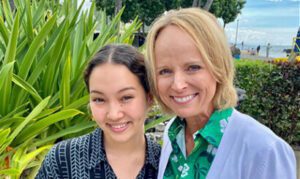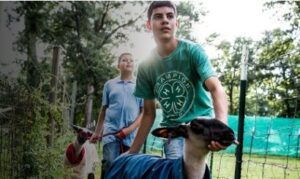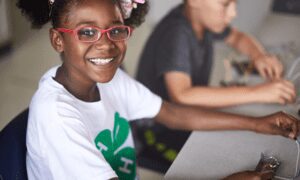When I think of mentoring and what the relationship means, there’s one particular word that I feel is at the core of why any mentorship exists: Future. Both the mentor and mentee build a relationship in the hopes of improving or positively affecting the other’s future. They share or grow a common bond/interest that could ultimately lead to a continued connection. They learn from one another and draw from the skills, knowledge, and experiences of the other in the hopes of having foresight into opportunities to come. Whether directly or indirectly, a mentor and mentee are a part of each other’s future.
In 2002, St. Louis 4-H and Kansas City 4-H set out to help prepare youth for their future and created 4-H Youth Futures, a program described as an “extensive college orientation program.” The collaboration brought together 40 local high school students who were given the opportunity to connect with one another and gave them the knowledge and skills to take charge of their futures. Today, 4-H Youth Futures serves nearly 1,000 youth across the state of Missouri, through the grant-funded 4-H National Mentoring Program.
The 4-H Youth Futures program is one that I have always admired. It is opening doors for True Leaders to become first-generation college students, top scholars, and future leaders in their communities.
In honor of National Mentoring Month, I had the pleasure of connecting with two active members of the program: Tommy E. Thomas III, mentor, CLOVER Youth Development Specialist in Jackson County; and Raul Lares-Cruz, 4-H Youth Futures Kansas City program mentee. From both the mentor and mentee perspective, they how the futures of Missouri youth and their communities are looking brighter because of the impact of the 4-H Youth Futures program.
"[Mentor and mentee] learn from one another and draw from the skills, knowledge, and experiences of the other in the hopes of having foresight into opportunities to come."
Tommy: I began my involvement with the 4‑H Youth Futures program upon starting my role as a 4‑H Youth Specialist with the University of Missouri Extension in October 2016. I took over all responsibilities for the National Mentoring Program Seven – Youth Futures program including program implementation and mentor/mentee recruitment.
Raul: I got involved in 4‑H Youth Futures because of the college advisor at my high school. She told me about the program, and I thought I would benefit from it.
How has the program made an impact on your life?
Tommy: 4‑H Youth Futures has made an impact on my life by allowing me the opportunity to encourage traditionally underserved students they can indeed attend and graduate from college. Our program provides services to students and families who previously may not have been encouraged to go to college. This program means a lot to me!
Raul: This program influenced my life in many ways. I learned there is a lot of money out there that goes unclaimed. The most significant impact 4‑H Youth Futures has made in my life is learning not to give up on my dreams because of financial challenges.
Why do you think it’s important for youth to have a mentor?
Tommy: I believe its pertinent for youth to have mentors because having someone else you can communicate with provides an additional resource for success. Mentors in our program have all graduated from college, so we share our stories (positives and challenges) about our collegiate experiences. I want students in our program to know if we can make it, they can as well!
Raul: It is important to have a mentor because mentors will help guide you through all the things you need help with.
"Not everyone is able to have a mentor, but those who do should be glad to have one."
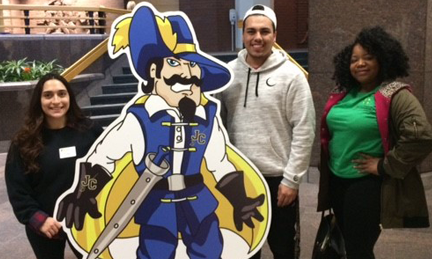
Raul, how have you seen an improvement in your relationships with your family and peers since being a part of Youth Futures? How has the program changed your life?
Raul: Since I started 4‑H Youth Futures, I noticed a difference on how I talk to my peers and my family. My points of view are much different from what they used to be. Previously, it was hard for me to think about going to college because of my family’s financial situation and my status as being an undocumented student. Now, my family and I are more aware of opportunities so I can go to college.
As an adult mentor, what growth have you seen in Youth Futures members as a result of the program and mentor-mentee relationships?
Tommy: Over the last 12 months, I have seen 4‑H Youth Futures members grow in several areas, including confidence, knowledge about being successful in college, and a greater understanding of their local communities. Many of the members in our program started as bashful high school students who wanted to go to college but had no idea how to do it. Now, students know how to command a room by speaking about their collegiate and professional goals.
How does your community benefit from the Youth Futures program?
Tommy: I feel our community benefits from the 4‑H Youth Futures program through becoming more connected. We have numerous partners who work with our program such as educational institutions, companies, and non-profit organizations all within our community. The youth in our program can experience first-hand how people and organizations in our community can all work together to achieve goals.
Raul: My community is getting a big opportunity that not a lot of communities have. Not everyone is able to have a mentor, but those who do should be glad to have one. My community is benefiting from having the opportunity to have mentors from 4‑H Youth Futures who can show us things about college we would not know about.
And how have you kept youth engaged in the Youth Futures program?
Tommy: I want to make sure youth continue to be engaged in our program by making it fun! We know students have a plethora of other activities they could be involved in, so not only do we provide amazing information, we make sure everyone has a great time in the process!
"You can never be around too many people who want to help you succeed!"
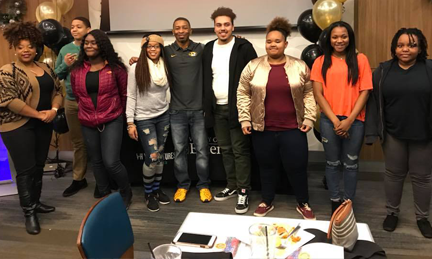
How do you think having a mentor can have a positive impact on a young person’s relationship with their family, peers or others in their day to day lives?
Tommy: Mentors can provide a positive impact on a young person’s relationship with family by providing additional encouragement for youth. There are many negative influences in the lives of youth today, so we want to give families as much support as possible.
Raul: Having a mentor is a positive impact because not only do they teach you how to apply for colleges and scholarships but they also teach you how to pay for college. Mentors also help us with improve our public speaking and not being so shy around other people.
Lastly, what advice would you offer to a young person who may be seeking or considering having a mentor?
Tommy: Do it! Reach out to your local schools, faith-based institutions, and community organizations about connecting with a mentor. You can never be around too many people who want to help you succeed!
Raul: My advice for anyone seeking a mentor is to get one as soon as possible! Mentors provide opportunities that help you become more informed about getting into college and finding scholarships. I am not saying if you do not get a mentor you cannot make it to college, you will just be more informed and prepared for everything.
The program described here is funded through grants from OJJPD, Office of Justice Programs, U.S. Department of Justice. Neither the U.S. Department of Justice nor any of its components operate, control, are responsible for, or necessarily endorse, this page (including, without limitation, its content, technical infrastructure, and policies, and any services or tools provided).










